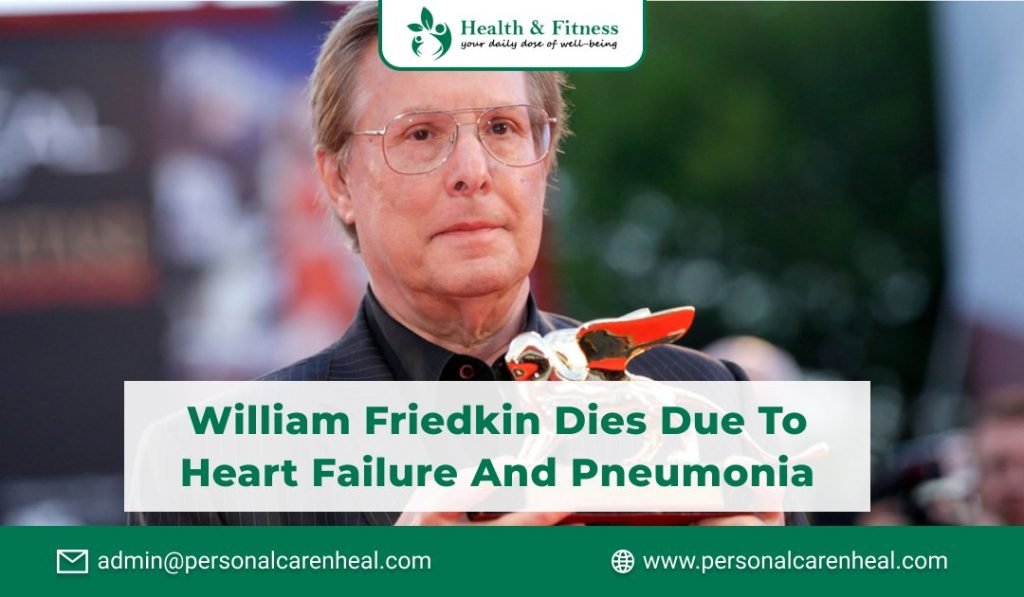A filmmaker, William Friedkin whose fascination and visceral style with characters helped make “The Exorcist” and “The French Connection” two of the biggest box-office hits, died at his home in the Bel Air near Los Angeles. He died due to heart failure and pneumonia, said his wife. He died a few weeks before the release of his movie, “The Caine Mutiny Court-Martial”, a movie that is based on the Herman Wouk play.
Working with a medium to low budget, William and D’Antoni are based on a cast of unknowns. Roy Schieder took the role of Grosso. Gene Hackman was chosen to play his partner, Popeye Doyle. “The French Connection” received five Academy Awards, including best director for Friedkin, best picture, and best actor for Gene Hackman. Everyone got shocked by “The Exorcist” because of its story of an innocent 12-year-old girl and the role played by Linda Blair.
What are Heart Failure Causes?
The most common reason behind heart failure is coronary artery disease (CAD) which narrows arteries that supply oxygen and blood to the heart. The following are other conditions that can increase the risk of heart failure:
heart attack
cardiomyopathy, is a disorder of the heart muscle that causes the heart to become weak
congenital heart disease
heart valve disease
certain types of arrhythmias, or irregular heart rate
high blood pressure
emphysema, a disease of the lung
untreated sleep apnea
diabetes
an overactive or underactive thyroid
HIV
severe forms of anaemia
substance misuse disorder
What are Heart Failure Symptoms?
Here are some signs of heart failure:
fatigue
sudden weight gain
a loss of appetite
persistent coughing
irregular heart rate
heart palpitations
abdominal swelling
shortness of breath
exercise intolerance
sleeping on extra pillows
while lying down getting short of breath
protruding neck veins
Heart Failure Stages
The following are different heart failure stages:
Stage A
In this stage, you may get heart failure if you have:
High blood pressure
Diabetes
Metabolic syndrome
Coronary artery disease
Your healthcare provider may suggest you regular exercise, and you should stop drinking alcohol, illegal drugs, and smoking. You need to take steps to regulate high blood pressure.
Stage B
You may be in the stage if you have never had heart failure signs but you are diagnosed with systolic left ventricular dysfunction, which means the left chamber of your heart doesn’t pump accurately. You may be in this group if you have or had:
Heart attack
Valve disease
Cardiomyopathy
Stage C
You may be in this stage if you have systolic heart failure and some symptoms such as:
Shortness of breath
Fatigue
Less ability to exercise
Your doctor may prescribe beta-blockers and ACE inhibitors, neprilysin inhibitors, and angiotensin receptor blockers.
Stage D
If you receive medical attention and discover that you have advanced symptoms of systolic heart failure, you are in this phase. Stage D will also benefit from some of the therapies used in stages A, B, and C. Your physician might also go over:
surgery options
heart transplant
ventricular assist devices
Treatments Congestive Heart Failure
Lifestyle changes: The same adjustments were made to prevent cardiac failure. You might also be told to stay away from salt (which can induce fluid retention) and caffeine (which can cause irregular heartbeats). If your doctor thinks you should limit your fluid intake, they will suggest you on how much and what kind to drink.
Medications: Your doctor may prescribe you:
Diuretics
Aldosterone inhibitors
Vasodolators
ACE inhibitors
Beta-blockers
Antiplatelets or anticoagulants
Digitalis glycosides
Surgical procedures
In worst cases, surgery is required to bypass or open blocked arteries, or to replace heart valves. The following are some surgery procedures:
heart transplant
Percutaneous coronary intervention
Coronary artery bypass
Valve replacement
How Pneumonia Occurs?
When your immune system fights infection in the tiny sacs of your lung (alveoli), pneumonia may result. Your lungs swell and start to leak as a result of this. The infections that result in pneumonia can be brought on by numerous bacteria, viruses, and fungi. Adults are more commonly affected by bacteria, whereas school-aged children are most frequently affected by viruses. Pneumonia is frequently brought on by the following conditions:
common cold
COVID-19 (SARS-COV-2)
The flu (influenza virus)
Human parainfluenza virus (HPIV)
Human metapneumovirus (HMPV)
Pneumococcal disease
Legionnaires’ disease
Mycoplasma pneumonia bacteria
Respiratory syncytial virus (RSV)
Pneumocystis pneumonia
Pneumonia Disease Symptoms
The following are symptoms of bacterial pneumonia:
tiredness
rapid heart rate
chest pain
loss of appetite
sweating or chills
rapid breathing
The following are symptoms of viral pneumonia:
headache
dry cough
loss of appetite
vomiting
lack of energy
Conclusion
The blog shares information on the demise of William Friedkin director of “The Exorcist” and “The French Connection”. Apart from this, it also shares heart failure and pneumonia causes symptoms and treatments. Moreover, get such informative blogs on our website by subscribing to Personal Care N Heal.



